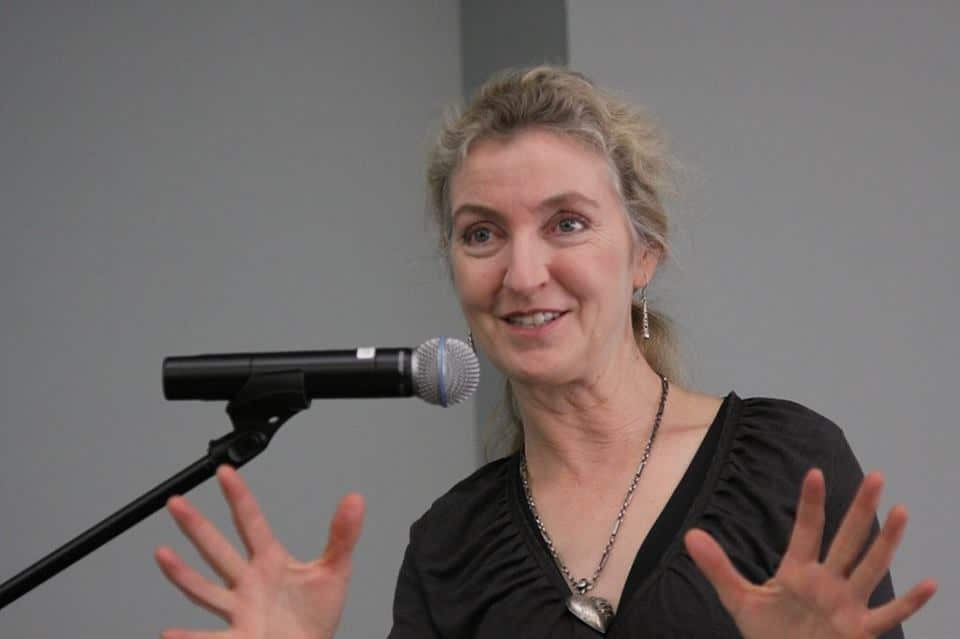
by Kelsey Mc Lendon
In a crowded room at the Literaturhaus in Stuttgart, members of our Democrats Abroad Women’s Caucus gathered with about 180 people to listen to Rebecca Solnit perform readings of her newest book, a collection of essays titled, The Mother of All Questions, and answer questions about literature, activism, and the future of American politics.
Solnit’s book begins by challenging the notion that a woman’s capacity is limited solely to childbearing rather than creations of the mind. Recalling a talk she gave on Virginia Woolf, Solnit described how the line of questioning quickly turned to reasons for why Woolf didn’t procreate instead of focusing on what she did create—her exceptional written work. In fact, one of the things Woolf famously wrote about was dismantling expectations for women to be the “Angel in the House.” Nearly 90 years later, women continue fighting against this ideal, and Solnit’s book argues that we must refuse questions that attempt to define what it means to be a woman. Instead, Solnit says, we must reject simple answers and embrace the unknown.
When reflecting on the literary canon, Solnit remarked that a book without a single woman in it is about humanity, but a book with a woman protagonist is a “woman’s book.” Knowing that we learn to imagine the world from the literature we read, it’s no wonder that straight, white men in particular often cannot imagine themselves as anyone else—they’ve never had to do so. In this way, diverse stories have never been more important because they provide us with different lenses through which to view the world and invite questions about whose stories are being told. Thanks to literary giants of the past like Woolf, James Baldwin, Gabriel Garcia-Marquez, and so many others, we’ve seen an explosion of diverse literature in the past few decades that asks all readers to listen and reimagine the world.
In conjunction with examining whose stories are told, Solnit’s book also prompts readers to consider silence—specifically, who has been silenced historically and currently. Perhaps the loudest breaking of that silence recently has been the #MeToo movement. While it seems like #MeToo was a sudden wave of unleashed stories, unprecedented support for those stories, and demands of accountability, Solnit reminds us that #MeToo was a culmination of previous, long-term efforts of women (often women of color) speaking out. As demonstrated in the #MeToo movement, stories grant the previously silenced the ability to be heard and grant everyone else opportunities to broaden their perspectives.
Placing these notions of silence, stories, and listening in context with the larger political climate, Solnit urged the audience to remember that elections are the bedrock of democracy but daily actions are what preserve it. If we are to recover from the Trump presidency, it is imperative that we read about the past, listen to each other’s stories, and, as Rep. John Lewis has said, make “good trouble, necessary trouble.” November is still far off, and we must work every day to defend our basic rights and democratic values. Referencing an article in The Guardian, Solnit stated that historical studies suggest it only takes 3.5% of a country’s population (about 11 million people in the U.S.) to topple an unpopular regime through sustained nonviolent opposition.
Solnit announced that an upcoming campaign to impeach Trump will be starting soon.
The Women’s Caucus international book club, Books Abroad, will discuss The Mother of All Questions at our next meeting on Sunday, October 21. Please join in!
Below is a list of readings that Solnit referenced throughout the evening:
A Room of One’s Own by Virginia Woolf
The Feminine Mystique by Betty Friedan
The writings of Subcomandante Marcos
“Peculiar Benefits” by Roxana Gay
Healing from Hate: How Young Men Get Into―and Out of―Violent Extremism by Michael Kimmel
“It may only take 3.5% of the population to topple a dictator – with civil resistance” by Erica Chenoweth


